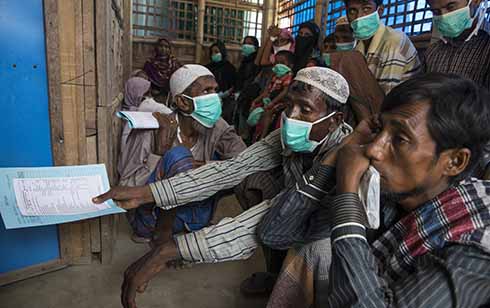 Pope Francis' prayer intention for April is for doctors and their humanitarian collaboraters in war zones, who risk their lives to save the lives of other.
Pope Francis' prayer intention for April is for doctors and their humanitarian collaboraters in war zones, who risk their lives to save the lives of other.
Jesus famously said he could not work miracles in Nazareth because a prophet is without honour in his own country.
He preached and healed elsewhere. Pope Francis picked up this insight when he spoke of the Church as a field hospital. He calls on Catholics, and especially priests, to leave the comfort zone where we are surrounded by people who think alike. We are to sally out into no man’s land to share the life of people who are on the edges of faith and of church.
NO MAN'S LAND
The Pope’s intention for April expresses this spirit when he asks us to pray for doctors and their companions – nurses, refugee staff and so on – who risk their lives in places of violence. Their world is no man’s land; the field hospital is their home. In their work they share the fears of the local people and must face their own fears, often far from the support of families and the comforts they have left behind.
Good doctors do more than heal the body. They are people on to whom we can transfer the anxieties and desperation that go with living in dangerous and disease-ridden places. Even if we are fortunate enough not to need their services we feel security in knowing they are there if we need them. They are a light of security and civilisation in a dark and dangerous place. They are one of the pillars around which a community may be built.
PILLARS OF COMMUNITY
Many doctors, indeed, remain pillars of community even when the time of immediate danger has passed. Weary Dunlop, for example, was the moral centre of many Australia soldiers captured and sent to the Burma Railway, and remained a centre of hope when they returned to Australia burdened by their memories. Other doctors who gave years of their life to work in the precarious refugee camps at the Cambodian Border with Thailand returned with the people to Cambodia. There they served in hospitals to which the villagers came.
It is easy to take for granted volunteers who risk their safety and health in order to accompany people whose lives are under threat. We notice them only when war claims them as victims as they and their clinics are destroyed by hostile or ‘friendly’ fire.
NETWORK OF RELATIONSHIPS
We see only their white coats and ignore their faces, losing sight of the hopes that brought them to the war zone, the people who love them and whom they love in a safer place, the pride or self-doubt they feel in their work, and the work they may have to do to calm their fears and to hang in. They are not isolated individuals. They bring with them a network of relationships which are thickened and enriched in the war zones.
In Christian faith we are all linked with medical staff and the endangered people whom they serve through the communion of saints: the network of relationships that stretches through time and well as through place, in which Jesus Christ is the centre. Pope Francis’ intention this month asks us to make that connection alive in our minds and hearts.
Image: Doctors Without Borders provide aid to Rohingya Refugees. Paula Bronstein/Getty Images